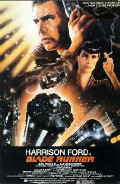
Directed by
Ridley Scott
117 minutes
Rated M
Reviewed by
Bernard Hemingway


Blade Runner (1992 Director's Cut)
Vastly better than the original 1982 studio release which flopped both commercially and critically, the 1992 Director's Cut version (just one of various versions of the film that have done the rounds over the years) removed both Harrison Ford's redundant voice-over and a tacked-on upbeat ending (which used out-takes from Kubrick's The Shining,1980) elements added by the studio after disconcertingly negative test screenings. This rehabilitated version of what was British director Scott's first fully American film has admirably restored Scott's original darker vision as well as adding a new digital rendition of Vangelis's score.
An iconic film in the sci-fi genre Blade Runner stands out primarily for its superb visualization of a dystopian Los Angeles. Much of the credit for this goes to design artist Syd Mead and cinematographer Jordan Cronenweth (as well as the Entertainment Effects Group, the special visual effects company headed up by SF/X maestro Douglas Trumball who had worked on 2001,1968, notably providing the "slitscan" effects for its climactic "Stargate" sequence). The result is an infernal metropolis, part garish part gloomy, rain-soaked "retro-futuristic" world (built completely on a Warner Bros back-lot) that is remarkable for its depth of detail (which has since been much imitated although only Terry Gilliam's Brazil,1985 and Tim Burton's Batman,1989, match it for quality). The '80s hair and make-up is not quite so pleasing, particularly for Daryl Hannah.
Harrison Ford, who had become a huge star as a result of Indiana Jones and The Raiders of The Lost Ark, released the previous year is to my mind too bland as Deckard, a "Blade Runner" whose job is "retiring" androids (Dustin Hoffman was attached in the role for a while but withdrew). This version (unlike its predecessors) however makes it clear that Deckard is himself a replicant, so that perhaps explains his lack of empathy whilst it also makes more plausible the emotional bonding between he and Rachel (Sean Young) another replicant, a suggestion which had been a tad ridiculous in the original release. The film offered early roles for both Hannah and Young who have since had long careers as jobbing actresses.
The film's screenplay by Hampton Fancher, and later supplemented by David Webb Peoples was loosely based on science-fiction writer Philip K. Dick's 1968 novel, 'Do Androids Dream of Electric Sheep?' (neither Peoples nor Scott had read the novel and worked from Fancher's original script) although the film's title comes from an unrelated William Burrough's novella.
FYI: Much of the neon signage was re-purposed from Coppola's unacknowledged 1982 masterpiece One From The Heart). A 25th anniversary digitally remastered "Final Cut" version was released in 2007 that is the only version fully authorized by Scott who was not satisfied with the so-called 1992 Director's Cut. Denis Villeneuve's 2017 sequel Blade Runner 2049 failed to capture the original's aura.
Want something different?





